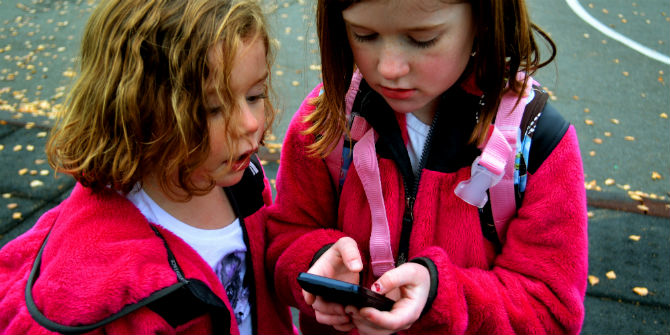 Globally, maternal well-being, including maternal mental health, is recognised to be critical for mothers, infants and families. The NHS predicts that digital technology is going to play a crucial role in developing mental health services, but how much do we know about how mothers’ online practices link to their offline lives? In this blog, Ranjana Das explores the potential of the digital for mothers’ mental well-being, looking at both its benefits and possible downsides. Ranjana is a Senior Lecturer in Media and Communication at University of Surrey. [Header image credit: M. Coghlan, CC BY-SA 2.0]
Globally, maternal well-being, including maternal mental health, is recognised to be critical for mothers, infants and families. The NHS predicts that digital technology is going to play a crucial role in developing mental health services, but how much do we know about how mothers’ online practices link to their offline lives? In this blog, Ranjana Das explores the potential of the digital for mothers’ mental well-being, looking at both its benefits and possible downsides. Ranjana is a Senior Lecturer in Media and Communication at University of Surrey. [Header image credit: M. Coghlan, CC BY-SA 2.0]
A BBC report has concluded that there is still a long way to go in supporting maternal mental well-being, and #mumtakeover on Twitter, following a BBC Radio 5 Live conversation, makes evident key gaps in support.
Globally, maternal well-being, including maternal mental health, is recognised to be critical for mothers, infants and families, with up to 15% of mothers facing mental health difficulties after having a baby. This is linked to an increased suicide risk for mothers and adverse outcomes for babies, also impacting mothers’ workforce participation. But face-to-face support from the NHS for mothers is under pressure owing to budget cuts in England, and patchy conditions elsewhere in the UK.
High ambitions
In the healthcare sector, digital technologies have been placed at the heart of an ambitious agenda. Mothers are going online to find information, support and social connections, using a range of sites, including general parenting forums, specialist online groups, people-nearby apps and perinatal support-focused Twitter hashtags.
But maternal well-being is conspicuously missing, in terms of its own distinct space, and referred to only occasionally in the documentation under Digital Child Health. Ambitious expectations are being articulated around digital ‘solutions’ in health and well-being, on which experts advise caution. The NHS Five Year Forward View predicts that, “digital technology is going to play a crucial role in developing mental health services,” and stresses that it would “improve the quality of healthcare and lower costs at the same time”.
As Sonia Livingstone notes, it’s not that technologies “make no difference. But nor has life been transformed beyond all recognition since the invention of the internet”. So:
- Is there merit in high degrees of optimism, as above?
- How much do we know about how mothers’ online practices link to their offline lives?
- Does maternal well-being stand to benefit from a more distinct space in the NHS digital strategy?
- How can challenges be met, through constructive, supportive and fair use of the internet by a variety of sectors?
I am exploring some of these questions, through qualitative, face-to-face fieldwork with pregnant women, new mothers, mothers of toddlers, charities and healthcare professionals, combining this with analysis of online data from a range of digital sites, using funding from first the British Academy (2016-18), and then the Wellcome Trust (2017-18).
Optimism
Interviews demonstrated that women who had access to the internet valued the sense of agency and initiative that came through self-directed information-seeking, often over and above other informal and formal sources. It also helped them cope with long waiting periods in accessing healthcare professionals. Cathy says:
“I mean, even if you didn’t post on them, just sort of, lurking … and, if you had a question, somebody else would as well … because what’s helpful, is real life experience.”
Many also spoke of how they wished healthcare professionals could be available on some of these forums.
Women using people-nearby apps, such as MUSH (which enables local mothers to connect with each other), showed that offline connections and meet-ups through online interfaces is crucial, both emotionally and socially. Elisa says she found this more useful than scheduled weekly meetings at a children’s centre far away:
“I found myself here, at home, and feeling really cut-off, in this small town. I discovered MUSH and I started meeting up with other mothers in the area.”
In seeking support on intimate perinatal queries, women spoke of the value of anonymity in finding online support. Mothers with un/diagnosed forms of postnatal depression and anxiety spoke of how critical online forums were when they felt even leaving the house to speak to a professional was too much. Mothers waking at night with infants, facing breastfeeding challenges, and the unavailability of telephone helplines at that hour, found online support critical. They also said how online support from other women enabled them to seek more equal, shared parenting responsibilities offline, at home, from fathers, for instance.
Caution
But not all findings lead to optimism. Women spoke of commercial, algorithmic targeting of adverts on Facebook inviting them to chart their fertility data, for example, and presented conflicting discourses around these invitations to self-monitor and self-regulate. These were often described as being “convenient and keeping me in the loop about my own body”, but also, the same participant, sounding low and confused, described how:
“… my temperature did not rise the way it was meant to, and this probably means another month and I have not conceived.”

Evidence from race studies and healthcare shows that migrant mothers face increased risks and cultural taboos around mental ill health. My interviews with them often showed perinatal isolation despite being surrounded by an extended family (many often feeling monitored and under surveillance). Online connections might bring benefits here, but I remain curious as to how these benefits, often claimed in the research on digital health divides, might pan out in reality.
Exclusion and silencing also occurs online. I have previously explored some of these issues as being linked to an environment of intensive parenting cultures. For example, women who have had difficult or traumatic birth experiences spoke of feeling silenced online. Charmaine said how her birth story – which involved the use of the word ‘pain’ – and she herself, had been eliminated from an online site:
“… populated by a group of women I had grown to trust and consider to be my friends.”
Maternal digital well-being?
A distinct place for maternal digital well-being in the NHS digital strategy would be useful in:
- Distinguishing the specific perinatal well-being needs of mothers, recognising cultural differences in approaches to well-being and digital health divides in the UK.
- Recognising key voices, trends, gaps and contextual factors in mothers’ use of technology for mental health and well-being, rejecting techno-euphoria around e-health solutions.
- Building partnerships with existing/semi-formal online communities where a healthcare professional presence would be useful.
- Expanding the current library of mobile apps for well-being to include maternal well-being.
- Building digital sites to better support mothers, drawing lessons from existing informal and community-led platforms.
- Ensuring continued support for offline support services, for which the digital is not a substitute.
- Ensuring that training in offline services includes training on digital well-being for mothers.
This post gives the views of the authors and does not represent the position of the LSE Parenting for a Digital Future blog, nor of the London School of Economics and Political Science.





